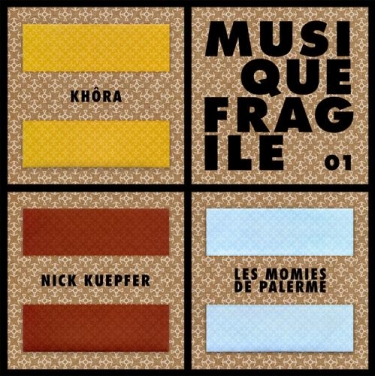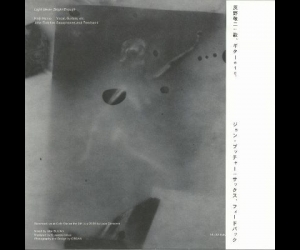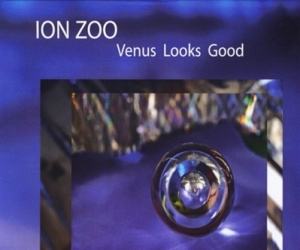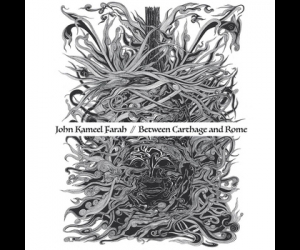
Montreal’s Constellation Records rose to prominence around the turn of the millennium, following the explosion of Godspeed You! Black Emperor’s popularity. While it’s sometimes tempting to allow that band and similar acts on the label’s roster to sum up Constellation’s identity, a more-than-cursory glance at its lineup of artists indicates an interest in far more than just brooding, extended, guitar-based ruminations. Several recent releases highlight the label’s diversity more than ever, as Constellation continues its steadfast commitment to nurturing exploration and depth.
The label’s Musique Fragile series emerged in November 2010 with a limited-edition set of three full-length releases—each by a different artist—packaged together. While the introduction of three distinct debut recordings together in one set is quite an unorthodox proposition, the set, comprising CDs by Nick Kuepfer, Les Momies de Palerme, and Khôra, is remarkably cohesive.
Nick Kuepfer’s CD Avestruz is a collection of ramshackle vignettes mostly recorded in Argentina on laptop and a borrowed four-track, with a few overdubs added at home in Montreal. Kuepfer constructs his pieces from interwoven polyrhythmic figures which shift dynamically beneath a surface of frayed texture—rusty plucked strings, tape hiss, creaks and scrapes, and cryptic field recordings that could’ve actually just been happening in the background of a take. Not unlike :zoviet*france:’s rustic minimalism, the patina of lo-fi detritus simultaneously cloaks and enhances the sophistication of the music, fusing with the clatter of found percussion, and the cyclical plucked motives. While Kuepher, through his timbral palette and flirtation with microtonality, intermittently recalls Harry Partch, he also—especially in his guitar work—manifests indebtedness to traditional folk-music forms. Near-recognizable fragments iterate, establishing a given piece, only to be infested by sonic mirages. This continual shift in perspective pushes Avestruz along a meandering dream-like trajectory, the final destination poignantly luminous yet emotionally charged, paying homage to a deceased friend.
Xarah Dion and Marie Davidson’s project Les Momies De Palerme maps a gothic—yes, as in goth—landscape where pale incantation-like vocals waft like dry ice across a dark and meager instrumental terrain of synths, guitar, violin, percussion, and, occasionally, stiff drum machine. On their Brûlez Ce Coeur CD, the duo’s atmospherics are tempered by a sweet, even playful, edge that slyly undermines any ostensible lugubriousness. While this spectre of ’80s-informed darkness looms, it doesn’t encroach upon the pair’s focus and originality. The strong presence of a juicy analogue-synth element gestures towards the warmth of 1970’s kosmische, while other ingredients have been plucked variously from the more diffuse end of recent psychedelia, free improv, and even liturgical musics.
Matthew Ramolo, a.k.a. Toronto’s Khôra, masterfully reconciles polar elements into a cohesive and personal whole. His CD Silent Your Body Is Endless, though full of gorgeous resonant billows, is also crawling with intense, fricative detail. Downright pretty chordal figures chime generously, but disintegrate into flickering shards. Coarse bristles of distortion comb through warm drone. Ramolo has honed an idiosyncratic negotiation of acoustic elements—notably guitar, piano, and field recordings—with electronics, a negotiation which is both wide-eyed and stricken with vague foreboding. Related to ambient music in its slow-moving modal harmony and muted electronics, his understated dynamism instills slight disquiet, anchoring his work elsewhere.
Constellation ties the set together through the hermetic aspect of its constituent parts. Their Web site identifies the discs as “works that were conceived/executed in different forms of isolation (physical, artistic) and also each in its own way invoking a sense of esoteric mysticism.” Each of the three albums exudes a singular and solitary vision, but are definitely united through aesthetic and procedural through-lines.
Elfin Saddle’s DVD Wurld is a further indication of the label’s adventurousness. As jam-packed as the triple-disc set, it boasts a twenty-three-minute film directed by the band, a concert video, further documentation of their quirky installations, and three audio tracks. The titular video depicts, through clever and simple animation, using a variety of natural and re-purposed everyday objects, the transformation of a miniature landscape from being fully natural to being cripplingly industrialized, ending up with flame-belching tubes, plastic imitation-foliage, and static-sputtering televisions. The soundtrack is a fascinating departure from the group’s rickety-yet-meticulous folk songcraft, with its wheezing accordions, loose, woody guitar, and wonky rhythms. Here, the asthmatic free-reeds are intact¸ but otherwise it’s an odd mixture of dust-caked mechanical whirrings, interlocking bells, mallet percussion and drums evocative of various Indonesian musics, the choked resonance of bowed metals, and crackle-marred scraps that sound as though they were excavated from a mutilated 78-rpm record. All this charts the film’s progress from pastoral to near-apocalyptic. Conveying a slightly unsettling fragility, the sight and sound of Wurld are stirringly memorable. The audio appendices, A River of Horses and A Tree In Dark Water / A Sinking Celebration are closer to the band’s song-based material, but seem to share some of the brittleness of Wurld’s soundtrack, reminiscent of some of the quiet clamour of Tom Waits’ Black Rider.
With its enduring devotion to exploratory—even subversive—artists of all stripes; to artful and generous packaging; and to presenting alternative sorts of projects, Constellation is one of the most relevant, exciting, and important record labels today. Few others have successfully embraced both a strange pop and an outright experimental sensibility in such a substantial, uncompromising, and staunchly independent manner. Certainly we can expect future releases to follow this risk-taking path.


